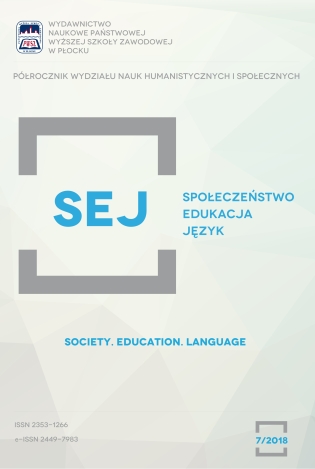“Borne-Across Humans” – the Migrant Experience as a Way of Viewing Artistic Practice
Abstrakt
DOI: 10.19251/sej/2018.7(6)
In an essay on Günter Grass, Salman Rushdie suggests that the migrant experiences a triple disruption involving place, language and behaviour. Rather than being disabling, however, Rushdie [1992, p. 278] views it is empowering, where migrants become something magical, “borne-across humans – (…) metaphorical beings in their very essence.” In the first part of the paper it is suggested that Rushdie’s description of Grass as migrant not only gives a useful way of viewing the writer’s work, but also provides a tool for viewing other artists’ work. In doing so, the initial premise is extended to cover the existential alienation of which both Albert Camus and Jean-Paul Sartre write, as well as Gilles Deleuze’s examination of the event. In the second part of the article, in light of these considerations, works by the artist and theatre director Tadeusz Kantor are analysed – Linia Podziału [The Dividing Line, 1966] and Umarła Klasa [The Dead Class, 1975], as well as the writer and playwright Samuel Beckett – Watt [1953], Molloy [1955] and Waiting for Godot [1955]. In the conclusion, it is suggested that even though there may be positive aspects to migrant experience these may not be (or want to be) understood.
Key words: migrant, alienation, event, Salman Rushdie, Günter Grass, Tadeusz Kantor, Samuel Beckett
Bibliografia
References:
[www1] Ayres Robert. 2012. “A Sky Filled with Shooting Stars: A Resident Alien Visits the Art World”, http://www.askyfilledwithshootingstars.com/word¬press/?p=1371, (Accessed: 1 April 2012).
Baranowa Anna and Bernadeta Stano. 2006. “Linia podziału Tadeusza Kantora – wielość interpretacji”, Dekada Literacka 6 (220).
Beckett Samuel. 2006. Samuel Beckett: The Complete Dramatic Works. London: Faber and Faber.
Beckett Samuel. 2009. Three Novels: Molloy, Malone Dies, The Unnamable. New York: Grove Press.
Beckett Samuel. 2009. Watt. New York: Grove Press.
Bree Germaine. 1974. Camus and Sartre : Crisis and Commitment. London: Calder and Boyars.
Camus Albert. 1983. The Outsider. Trans. Joseph Laredo. London: Penguin Books.
Deleuze Gilles. 1993. The Fold: Leibniz and the Baroque. Trans. Tom Conley. London: The Athlone Press.
Deleuze Gilles and Félix Guattari. 1987. A Thousand Plateaus: Capitalism and Schizophrenia. Vol.2. Trans. Brian Massumi. Minneapolis: University of Minnesota Press.
Dziewulska Małgorzata. 2007. A meeting of two realities. In Accompanying booklet Umarła Klasa: Seans Tadeusza Kantora zapis filmowy Andrzeja Wajdy. Prodkcja P.R.F. „Zespoły filmowe” Zespół X.
[www2] Encyclopedia Britannica. 2016. “Migration”, https://www.britannica.com/science/population-biology-and-anthropology/Migration#toc60665, (Accessed: 16 October 2016).
Fletcher John, Beryl Fletcher, Barry Smith and Walter Bacham. 1978. A Student’s Guide to the Plays of Samuel Beckett. London: Faber and Faber.
Harrison Charles and Paul Wood, (eds.) 1994. Art in Theory 1900-1990: An Anthology of Changing Ideas. Oxford: Blackwell.
Limon Jerzy. 2006. Piąty wymiar teatru. Gdańsk: Słowo/obraz terytoria.
Lomax Yves. 1998. A Split Second of Paradise. In Live Art, Installations and Performance, eds. Nicky Childs and Jeni Walwin. London: Rivers Oram Press.
Mytkowska Joanna. 2000. The object that is got back by chance. In Tadeusz Kantor: Niemożliwe. Impossible, ed. Jarosław Suchan. Kraków: Bunkier Sztuki.
Państwowa Galeria Sztuki. 2004. Tadeusz Kantor – Umarła Klasa. Trans. Małgorzata Talikowska Musiał. Sopot: Państwowa Galeria Sztuki / Łódz: Galeria 86.
Robinson Michael. 1969. The Long Sonata of the Dead: A Study of Samuel Beckett. London: Rupert Hart-Davis.
Rushdie Salman. 1992. Imaginary Homelands: Essays and Criticism 1981-1991. London: Granta Books.
Rushdie Salman. 2013. Ojczyzny Wyobrażone: Eseje i teksty krytyczne 1981-1991. Przeł. Ewa i Tomasz Hornowscy. Poznań: Dom Wydawniczy Rebis.
Szuba Monika. 2012. “Of course he has no story”: Textes pour rien / Texts for Nothing. In Back to Beckett text, ed. Tomasz Wiśniewski. Gdańsk: Wydawnictwo Uniwersytetu Gdańskiego.
Tejeda Isabel. 2004. The Dead Class. In Tadeusz Kantor – Umarła Klasa, trans. Małgorzata Talikowska Musiał. Sopot: Państwowa Galeria Sztuki / Łódz: Galeria 86.
Wajda Andrzej. 2007 [1976]. Umarła Klasa: Seans Tadeusza Kantora zapis filmowy Andrzeja Wajdy. Produkcja P.R.F. „Zespoły filmowe” Zespół X.
Wiśniewski Tomasz. 2006. Kształt literacki dramatu Samuela Becketta. Kraków: Towarzystwo Autorów i Wydawców Prac Naukowych Universitas.
